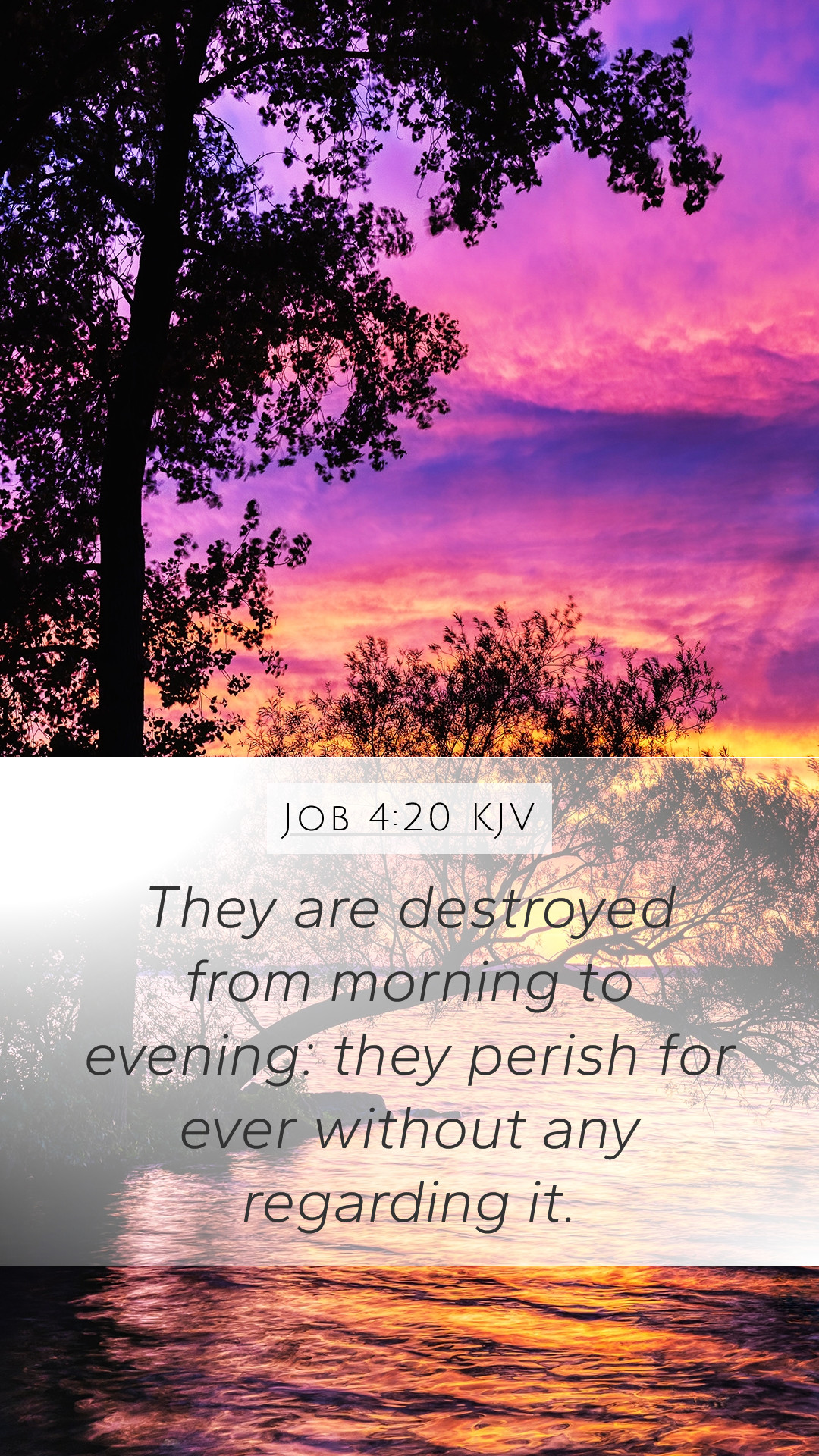Old Testament
Genesis Exodus Leviticus Numbers Deuteronomy Joshua Judges Ruth 1 Samuel 2 Samuel 1 Kings 2 Kings 1 Chronicles 2 Chronicles Ezra Nehemiah Esther Job Psalms Proverbs Ecclesiastes Song of Solomon Isaiah Jeremiah Lamentations Ezekiel Daniel Hosea Joel Amos Obadiah Jonah Micah Nahum Habakkuk Zephaniah Haggai Zechariah MalachiJob 4:20 Meaning
What is the meaning of Job 4:20?
They are destroyed from morning to evening: they perish for ever without any regarding it.
Job 4:20 Bible Verse Meaning
Understanding Job 4:20
Job 4:20 presents a profound insight into the fragility of human existence. This verse states, "They are destroyed from morning till evening: they perish for ever without any regarding it." In the context of this verse, the speaker, Eliphaz, seeks to illustrate the inevitability and totality of death, emphasizing that human life is fleeting and often unacknowledged.
Bible Verse Meaning
Eliphaz’s statement reflects a stark reality about human mortality. Through a combination of sources from Matthew Henry, Albert Barnes, and Adam Clarke, we glean significant insights into the implications of this verse:
- Human Condition: Matthew Henry points out that every human being is subject to death, and this reality is a humbling reminder of our vulnerability.
- Mortal Nature: Albert Barnes interprets this to mean that life is short and is to be treated with reverence; people live and die without acknowledging their own mortality.
- Divine Perspective: Adam Clarke elaborates on the importance of viewing life from a divine perspective, suggesting that God sees beyond our immediate struggles, providing context to our suffering and trials.
Bible Verse Interpretations
The interpretations of Job 4:20 shed light on several aspects:
- Mortality's Finality: The idea that life can end abruptly reinforces the need for spiritual preparedness, a common theme in many biblical teachings.
- Awareness of Life's Value: The neglect of this awareness often leads people to waste their lives on trivial pursuits, highlighting the call for deeper self-reflection.
- Response to Suffering: This verse can act as a reminder during suffering, as it places the struggles of Job in a context—life is a continual struggle amidst the overarching reality of mortality.
Scripture Analysis
In analyzing the scripture and its implications, it is essential to draw connections within the text and to other passages. Job's reflections in this verse can resonate with several ideas from other parts of the Bible.
- Ecclesiastes 3:1-2: "To everything there is a season, and a time for every matter under heaven; a time to be born, and a time to die."
- Psalms 90:10: "The years of our life are seventy, or even by reason of strength eighty; yet their span is but toil and trouble; they are soon gone, and we fly away."
- James 4:14: "Yet you do not know what tomorrow will bring. What is your life? For you are a mist that appears for a little time and then vanishes."
Bible Study Insights
When engaging in a Bible study regarding Job 4:20, consider the following:
- Reflection on Life's Purpose: What does God want us to understand about our mortality?
- Behavioral Observations: How does this verse challenge us to reassess our daily priorities and values?
- Community Discussions: In Bible study groups, discussing the broader themes of life and death in Job can lead to deeper connections and shared experiences.
Application of Job 4:20 in Daily Life
The relevance of Job 4:20 in today's world is undeniable. Recognizing our mortality and the transient nature of life can lead us to live with intention.
- Value Relationships: Understanding that life is finite encourages us to cherish relationships and invest time in people.
- Seek Meaningful Experiences: This awareness spurs individuals to seek activities that fulfill their spiritual and emotional needs rather than the superficial.
- Prepare for the Future: By recognizing life's brevity, we become more inclined to prepare spiritually for what comes after, fostering a more profound faith.
Conclusion
Job 4:20 serves as a sobering reminder of the transitory nature of life, urging individuals to seek deeper understanding and purpose beyond mere existence. In Bible study, this verse invites dialogue about mortality, divine providence, and the significance of living with intention.


